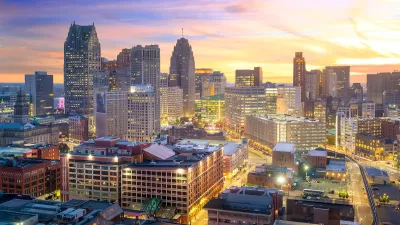Crowd-funded plans to build a statue of the movie character RoboCop are moving ahead in Detroit, and the project is redefining public participation in civic ventures.
Thousands of people, mainly from outside of Detroit, contributed more than $50,000 to help build the statue.
"It might not be exactly what the city of Detroit needs, but it is something. Dramatic population losses and evaporating jobs have put the city in a state of gradual decay that shows few signs of stopping. That caricature was even more pronounced in RoboCop the film, where crime was rampant and a virtually indestructible robot was the only thing that could stop the city from self-destruction. Brandon Walley, one of the organisers behind the statue campaign, says the plot still resonates in a city fighting for identity and struggling to persevere. 'I don't want to take it too far, but there are these parallels with Detroit that are interesting,' says Walley. 'This city needs so much. I'll be the first to admit that that money should go somewhere else, but there's nothing wrong with a bunch of people wanting to have fun.'
Most city governments long for this kind of interest in local decision-making, and they're increasingly relying on the Internet to provide such easy access to what's otherwise a timesuck at city hall. A pop culture statue doesn't exactly carry the same weight as a debate over a sales tax increase or a new mega-development, but Walley says it does represent a positive change for the city that locals and outsiders should get behind. As the project is privately funded, privately organised and slated to go up on land owned by Wayne State University, the City of Detroit is officially agnostic.
"
FULL STORY: Open Source Design 03: RoboCop: The Monument

Planetizen Federal Action Tracker
A weekly monitor of how Trump’s orders and actions are impacting planners and planning in America.

Maui's Vacation Rental Debate Turns Ugly
Verbal attacks, misinformation campaigns and fistfights plague a high-stakes debate to convert thousands of vacation rentals into long-term housing.

Restaurant Patios Were a Pandemic Win — Why Were They so Hard to Keep?
Social distancing requirements and changes in travel patterns prompted cities to pilot new uses for street and sidewalk space. Then it got complicated.

In California Battle of Housing vs. Environment, Housing Just Won
A new state law significantly limits the power of CEQA, an environmental review law that served as a powerful tool for blocking new development.

Boulder Eliminates Parking Minimums Citywide
Officials estimate the cost of building a single underground parking space at up to $100,000.

Orange County, Florida Adopts Largest US “Sprawl Repair” Code
The ‘Orange Code’ seeks to rectify decades of sprawl-inducing, car-oriented development.
Urban Design for Planners 1: Software Tools
This six-course series explores essential urban design concepts using open source software and equips planners with the tools they need to participate fully in the urban design process.
Planning for Universal Design
Learn the tools for implementing Universal Design in planning regulations.
Heyer Gruel & Associates PA
JM Goldson LLC
Custer County Colorado
City of Camden Redevelopment Agency
City of Astoria
Transportation Research & Education Center (TREC) at Portland State University
Jefferson Parish Government
Camden Redevelopment Agency
City of Claremont




























